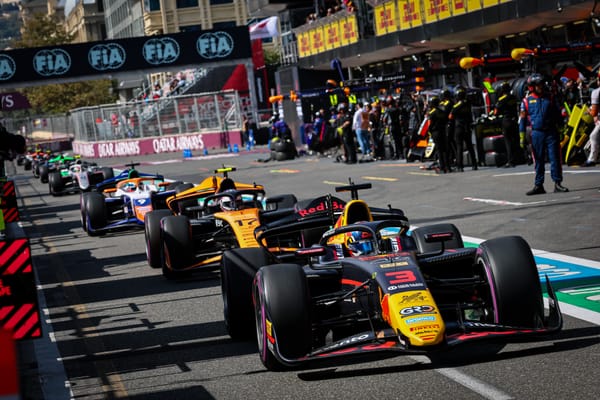How would Formula 1 survive a crypto crash?

Formula One teams have gone through ups and downs of sponsorship cycles before - but just how would a crypto crash hit the paddock?

McLaren’s Lando Norris crashes out of the Miami Grand Prix/Crypto sponsorships on various teams. (Formula 1/Red Bull/McLaren Racing/Mercedes F1)
Most teams on the grid currently have a major cryptocurrency sponsor from the all-encompassing Crypto.com joining Aston Martin, to little known 'Floki' meme-coin stickers on the Alfa Romeo.
Crypto assets bled nearly $800 billion in market value over the month to May 10, according to a Reuters analysis of CoinMarketCap data.
"Bitcoin, which makes up for nearly 40% of the crypto market, hit a 10-month low earlier on Tuesday, before rebounding to $31,450, just six days after touching $40,000," reports Reuters.
"It was more than 54% below its Nov. 10 all-time high of $69,000."
This is in stark contrast to the financial news from the F1 paddock, where Red Bull is reported to have earlier this year signed the biggest crypto sponsorship in sport with a US $150 million deal with exchange Bybit.

Red Bull launches their record-breaking Bybit sponsorship. (Red Bull)
Team sponsorship is an area of the sport fraught with controversy.
American team Haas Racing had a high-profile split with Rich Energy in 2019, when former CEO William Storey announced the cancellation of the contract on Twitter mid-season.
The team was brought back into sponsorship controversy at the start of this year when they terminated a title deal with Uralkali after the Russian energy firm's owner faced international sanctions after the invasion of Ukraine.
The most high-profile hurdle for F1 sponsorship was the tobacco industry, which remains involved in the sport despite a FIA ban at the end of the 2006 season.
The ban was the end of a era for the sport, with the three leading sponsors estimated to contribute US $753.3 million per year - a long way from the first ever full commercial sponsorship by South African tobacco brand Gunston in 1968.
Tobacco and e-cigarette sponsorship remains a controversial issue, with Philip Morris sponsoring Ferrari under the 'Mission Winnow' brand, while British American Tobacco sponsors McLaren through 'A Better Tomorrow' and their international e-cigarette brands.

E-cigarette brand Vuse and crypto ecosystem Tezos advertise on the McLaren car at the Miami Grand Prix. (McLaren Racing)
The point remains that while cigarette advertising presents a public health issue and personal issue, crypto sponsorship remains a multi-faceted risk.
Reuters attributes the recent crypto slump to global economic conditions:
"Digital asset prices have slumped, mirroring a plunge in equities on fears of aggressive interest rate hikes across the globe to stave off decades-high inflation."
The global crunch has started and its coming for crypto
While all discretionary spending by consumer brands is arguably tied to global economic conditions, the contractionary mood of global economics will hit financial assets first.
The US Federal Reserve and British Central Bank have led a global trend of rising interest rates to curb inflation after the COVID pandemic.
The Reserve Bank of Australia estimates that this contractionary policy will continue with further interest rate rises through 2022.

An artwork created to promote Mercedes’ partnership with FTX. (Mercedes Racing)
Bitcoin has fallen to its lowest price in 16 months as of May 12 and the Terra ‘LUNA’ project has sensationally collapsed in the past week.
As investors move away from speculative assets such as crypto, any further contractions are may keep hitting the crypto world.
Technical issues and lack of interest hits NFTs
Meanwhile, technical concerns plague crypto, with Ethereum, the coin with the second-largest market cap of US $284 billion (according to CoinMarketCap), shutting down due to high demand during a 'Bored Ape' event.
That is - the Ethereum blockchain, designed as a new-era payment platform, was unable to cope with high demand for its service.
Blockchains could be proving to be a goldilocks financial project - not too hot, not too cold - but demand needs to be just right for the system to function.
The aforementioned Bored Ape project has led Non-Fungible Token (NFT) speculation, with images sold for staggeringly high prices.
Recently, the floor price for NFTs is plunging, falling by 20% of more in the 24 hours to May 10, according to Decrypt.

Alpha Tauri drivers Pierre Gasly and Yuki Tsunoda at a fantom activation. (Red Bull)
Then there is 'yield farming' which involves high interest rates for 'staking' coins or tokens.
Sam Bankman-Fried, CEO and founder of crypto exchange FTX, infamously appeared on Bloomberg's 'Odd Lots" podcast.
Bankman-Fried was quizzed on the mechanics of yield farming, acknowledging the concerns of the hosts:
Matt Levine (Guest):
I think of myself as like a fairly cynical person. And that was so much more cynical than how I would’ve described farming. You’re just like, well, I’m in the Ponzi business and it’s pretty good.
Joe Weisenthal (Host):
At no point did any of this require any sort of like economic case, it’s just like other people put money in the box. And so I’m going to too, and then it’s more valuable. So they’re gonna put more money in, and at no point in the cycle, did it seem to like, describe any sort of like economic purpose?
Sam Bankman-Fried:
So on the one hand, I think that’s a pretty reasonable response, but let me play around with this a little bit. Because that’s one framing of this. And I think there’s like a sort of depressing amount of validity…
That's without getting into the security, longevity, or validity of some of these platforms.
The official Formula 1 NFT game ‘F1 Delta Time’ shut down in March, three years after its launch.
A ‘Australia Edition 2020’ token which raised funds for the bushfire recovery effort set the record for a virtual racing car at US $288,000.
The developers lost their license, transferring owners to their REVV Motorsport NFTs instead.

A promotional image from the F1 Delta Time game, shut down in March 2022. (REVV Motorsport)
Meanwhile Racefans notes:
"Fan token platform Iqoniq – whose logos previously appeared on Alfa Romeo, Williams and McLaren – went into liquidation earlier this year, leaving fans with valueless tokens."
As the saying goes, “if you want to be a millionaire in F1, start as a billionaire.”
Environmental concerns will come home to roost
A 2021 report from the New York Times opens with this startling sentence:
"The process of creating Bitcoin to spend or trade consumes around 91 terawatt-hours of electricity annually, more than is used by Finland, a nation of about 5.5 million."
There are increasingly loud concerns that crypto, especially speculative or vanity assets such as NFTs, are incredibly harmful for the environment in terms of their energy consumption.
Speculative markets, particularly the trading of images online in processes that use the same amount of electricity as small nations, is ripe for regulation as countries move towards the goals of the Paris Agreement to limit global warming by virtue of reducing greenhouse gas emissions.
In other words, governments will ban the sale of images of cartoon monkeys long before banning the dishwasher or electric stove - or is that itself just wishful thinking?
In addition, F1 has positioned itself as an energy champion as part of the global corporate move to combat global warming.
The sport is planning for a "100% sustainably fuelled hybrid engine" by 2025, with the corporate goal of "Net Zero Carbon" by 2030.

Crypto.com reportedly holds a US $100 million deal with the sport. (Getty Images/Red Bull)
Then there are the drivers and teams, who are free to set their own, more ambitious targets.
Williams have set the corporate goal to "become climate positive" by 2030, and Aston Martin driver Sebastian Vettel has committed himself to the cause, wearing branded apparel at each grand prix and even a helmet design for the Miami grand prix to promote action against climate change.
Sooner or later, the sport may have to reckon with accepting crypto sponsorships go against their shared ethos, just as tobacco sponsorship was banned unilaterally in 2006.
“We take the sustainability argument very seriously and of course so do our partners, so obviously we are looking at technologies that can improve that" Red Bull team boss Christian Horner told Motorsport.com.
"If we can assist to achieve that, it is an exciting new sector and it's great to see so much interest and that F1 is so attractive.”
Working with crypto brands to improve sustainability seems to be the attitude shared between the major teams.
“The sustainability argument is extremely important, but it is not only about mining and the energy that is consumed, but also where the energy comes from,” Mercedes team boss Toto Wolff said.
“But you can't shut yourself down to modern technology. It's definitely an area that will grow."
The huge crypto investment in Formula 1
If it is approaching a foregone conclusion that at least one of these factors could lead to the demise of crypto in F1, what impact will it have on the sport?
The sport itself has a US $100 million deal with Crypto.com, who is a global partner and holds naming rights to certain grands prix.
Red Bull's landmark deal with Bybit is reportedly a US $150 million contract over three years, while other sponsorships are harder to come by.
Crypto.com (Aston Martin), Bybit (Red Bull), FTX (Mercedes), Binance (Alpine) and OKX (McLaren) are all crypto exchanges.
While the overall outlook for crypto isn't great for the industry overall, the exchanges would be in the best position of all the crypto sponsors, clipping the ticket on the way up or the way down regardless.
Velas (Ferrari), Fantom (Alpha Tauri) and Tezos (McLaren/Red Bull) are all their own blockchain platforms or ecosystems.
While the ecosystems may be insulated from the broader crypto market, they are still dependent on the overall mood of the sector.
Ecosystems must remain self-sustainable to remain viable, attracting developers and partners to join and remain within the project.
For outsiders, the actual use of these platforms or the differences between them remain completely inscrutable.
The nature of the deals with Formula 1 teams remain similarly opaque.
For the most part, these deals have impacted fans the most, who have supported teams by purchasing NFTs or fan tokens.
These fans faced the consequences for their loyalty to the sport when the value of the tokens decreased - or in some cases evaporated.
If teams were more open about the partnerships, one could gather a clearer picture of the dollar value of their crypto exposure.
Like anything sensitive in Formula 1, the garage covers are drawn.
And like any cycle, F1 teams have proven their adaptability.
Through tobacco sponsorships, the dot com boom, sponsors have come and gone from the sport.
Haas Racing has been able to rebuild despite losing their title sponsor at the start of a pivotal season - perhaps helped by the excuse that sanctions make sponsorship fees non-refundable.
The American team also does not currently have a crypto partner listed on their website.
On the bright side, after the Rich Energy debacle, partnerships departments would be wise to the risks of brands joining the sport for the notoriety and leaving without paying their bills.
But the recent fall is concerning, and the first sponsor to leave the pack may signal the change of winds in the paddock.
Perhaps it has already happened, with Turkish ecosystem Bitci departing a "multi-year partnership" with McLaren after one season.
The deal lasted from March 2021 to February 2022.
Surely crypto also funds Highway F1 - the keywords in this article are enough to guarantee that you are probably seeing an ad next to this article.
And Alfa Romeo?
Alfa counts Floki among its sponsors, a 'meme-coin' trading off the back off success of crypto projects such as Dogecoin.
"The coin is named after Elon Musk's Shiba Inu" reads the description on CoinMarketCap, which should tell you all you need to know about this project.
Elsewhere in the CoinMarketCap profile for Floki:
"Not a meme coin, but a movement."
Quite.





